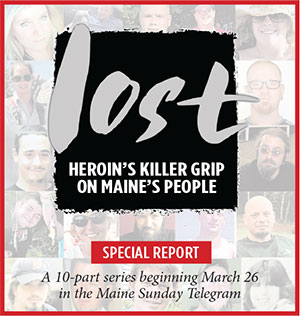AUGUSTA — A new task force on Maine’s opioid crisis, the latest attempt by lawmakers to wrap their arms around the deadly problem, will not recommend specific legislation in its first draft report that’s due next week.
Instead, the report – drafted after only two meetings – will summarize what has been done already and identify additional information the task force would like to receive as it continues its work through this year.
Rep. Joyce McCreight, D-Harpswell, who co-chairs the task force, said there already are several bills under consideration this session that look to address the crisis, which claimed 376 lives last year – the highest annual total on record.
“I think we can wait and see what passes and what doesn’t and then focus our efforts from there,” she said.
Among the more ambitious proposals are three bills sponsored by Rep. Karen Vachon, R-Scarborough. One would create a “hub-and-spoke” model to better direct people seeking treatment to the option that best suits them. It’s modeled after a program in Vermont.
Another proposal calls for $13.2 million in new spending over the next two years to increase medication-assisted treatment options for Mainers, especially for those who can’t afford treatment or who don’t have insurance. That would be on top of the $5.4 million the state has committed to expand medication-assisted treatment dating back to last December.
Vachon’s third bill would tackle the prevention and harm-reduction side of the crisis by increasing state spending for needle exchange programs and for naloxone, a drug that reverses the effects of an opioid overdose.
“I think we have a lot to do but really we need to treat this with more compassion,” she said.
While opiate addiction is a problem nationwide, the crisis has been more acute in Maine than nearly anywhere else in the country, as detailed in a recent 10-part Portland Press Herald series titled “Lost: Heroin’s Killer Grip on Maine’s People.”
During Friday’s task force meeting, there was frustration from members – a mix of lawmakers, treatment specialists and law enforcement officials – about a lack of solid data from the Maine Department of Health and Human Services. No one seemed to have concrete information about how many treatment beds Maine has, how many are available to Medicaid patients, or even how many people have been receiving medication-assisted treatment.
“We still don’t really know how many people are addicted and how many are in treatment at this time,” said Sen. Geoffrey Gratwick, D-Bangor, a member of the task force. “I think we need to have that larger perspective when we think about allocating resources.”
There also was confusion about how much money is being spent and where that money is going.
No one from DHHS attended Friday’s meeting, and McCreight said the LePage administration told the task force it wasn’t interested in participating and that any questions or requests for information should be sent in writing.
Another area of concern among some members was holding the state accountable on legislation that already has passed. Dating back to last year, the state has not followed through on at least two laws that passed to address the opioid crisis.
One was a bill to create two new community-based recovery centers. The state still has not submitted requests for proposals. The other was a bill to allow people to purchase naloxone over the counter at a pharmacy. The state regulatory board still has yet to create rules to allow this to happen, even though the law passed almost a year ago.
The state has, however, moved forward with other initiatives in recent months to improve access to treatment. That’s a departure from Gov. Paul LePage’s insistence that treatment has not been the problem.
DHHS Commissioner Mary Mayhew this month announced the creation of an Opioid Health Home model, a team-based approach to care that focuses on treating the whole person through substance abuse counseling, care coordination, medication-assisted treatment, peer support and medical consultation.
That program has restrictions, though: Patients need to have a secondary diagnosis other than substance use disorder.
No matter what happens over the remainder of the legislative session, McCreight said the task force would continue its work. Its final report, due in December, she hopes will have more detailed recommendations for legislation that could be considered next session.
Copy the Story Link
Send questions/comments to the editors.




Success. Please wait for the page to reload. If the page does not reload within 5 seconds, please refresh the page.
Enter your email and password to access comments.
Hi, to comment on stories you must . This profile is in addition to your subscription and website login.
Already have a commenting profile? .
Invalid username/password.
Please check your email to confirm and complete your registration.
Only subscribers are eligible to post comments. Please subscribe or login first for digital access. Here’s why.
Use the form below to reset your password. When you've submitted your account email, we will send an email with a reset code.